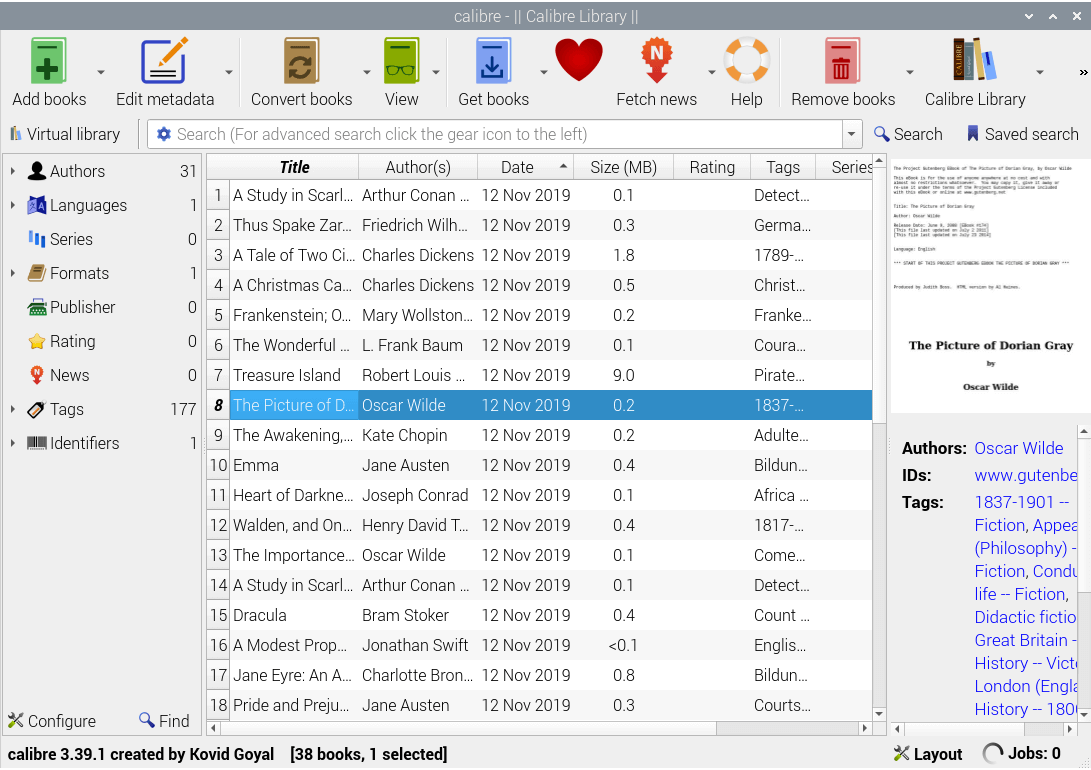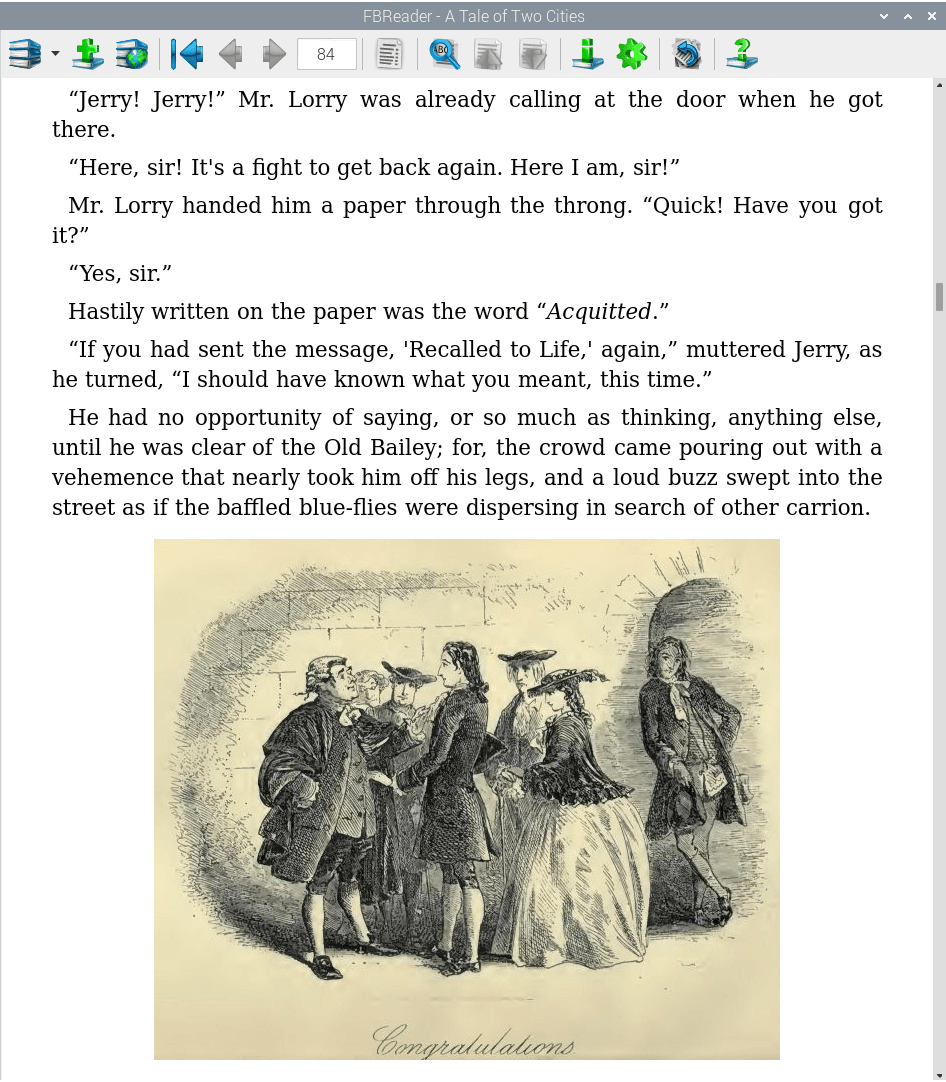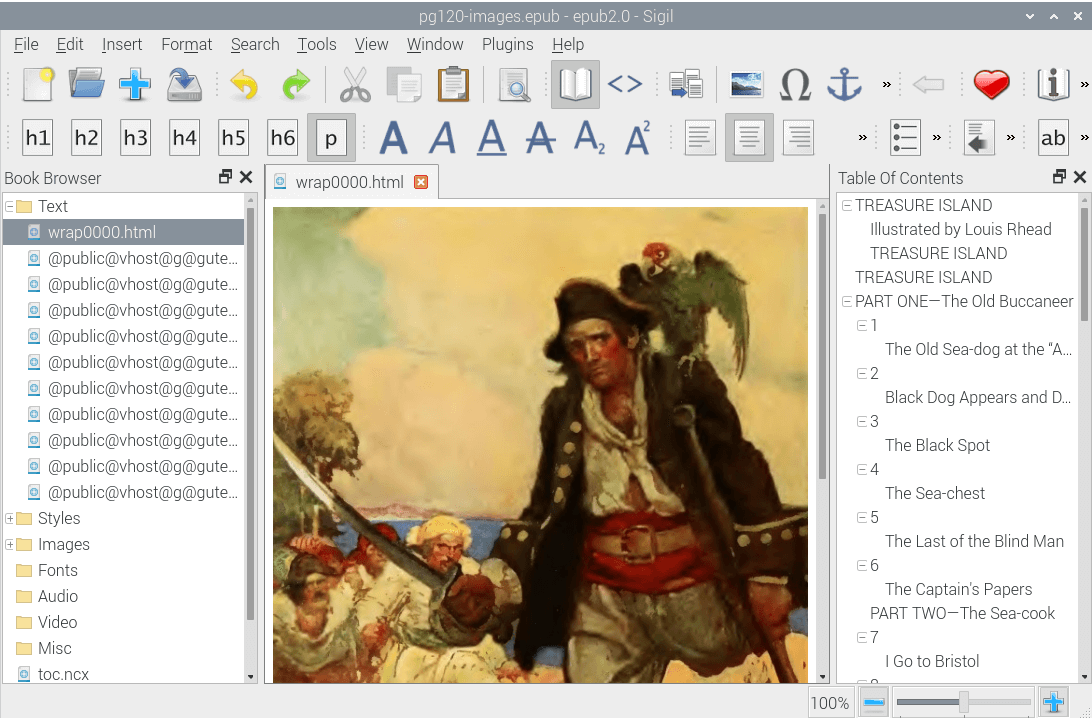Last Updated on March 18, 2020
This is a weekly blog about the Raspberry Pi 4 (“RPI4”), the latest product in the popular Raspberry Pi range of computers.
The last three weeks I’ve examined how the RPI4 copes with cornerstone desktop activities: web browsing, email, and office suite. In most respects, the RPI4 passed with flying colours. If this was an ‘A’ level examination, performance wouldn’t justify an A*. But the RPI4 would probably scrape an A.
I haven’t used e-book reader software for many years. Most of my reading time is spent in front of the “olde prehistoric” paperback. I can read them anywhere. If I drop one in a puddle there’s no commotion, and they even make a useful flyswatter. But I recognize e-book readers are popular among desktop users, so paperbacks have been deserted in favor of their digital brethren for this week.
There’s lots of sources for free e-books. I thought I’d take the opportunity to read some classic books this week, a motley selection of books listed in the current Top 100 on Project Gutenberg.
When I’m researching software for the RPI4 for applications I’ve not previously explored, I usually start with Group Tests. There’s a group test for e-book tools which includes e-book readers. The readers with the highest scores are Calibre and FBReader. Sigil is an e-book editor. They have packages in the Raspbian repository. The other e-book readers listed (Lector and Bookworm) don’t have Raspbian packages. So I’ll focus on Calibre, FBReader, and Sigil(1).
Calibre

Installing Calibre (with the command “sudo apt install calibre”) pulls in 50 new packages, and uses 148MB of additional disk space.
You get an old version of Calibre. It’s release 3.39.1 published in February 2019. There’s been significant development since then. Given all the dependencies that Calibre relies on, I suspect it isn’t trivial to compile and install the latest version on the RPI4. But I’m happy to be proved wrong.
How does Calibre fare on the RPI4? I’m pleased to report it’s a real pleasure to read e-books with Calibre. Truly glorious. Even really large e-books load immediately, and are quick to traverse. The software supports a huge range of e-book formats, handling everything with aplomb.
The software is highly customizable, offers essential features such as bookmarks, searching, and a full screen mode. Things like user stylesheets, theming, dictionaries, keyboard shortcuts, and much more. The page flip animations aren’t to my liking, but they are easily disabled.
Calibre is jam-packed with other features. Besides reading e-books, it offers the ability to fetch news from a wide variety of resources with RSS, edit metadata, and convert books including bulk conversion. It’s an excellent example of quality open source software.
The software lets you convert e-books to PDF format, although it only uses a single core for this task. Converting Great Expectations to PDF took about 45 seconds, but most e-books convert significantly faster.
With a small library of 38 books, and viewing a single book, Calibre consumes 256MB of RAM. A significant memory footprint, but something that might only be an issue for the 1GB model of the RPI4.
FBReader

FBReader also works excellently on the RPI4. The software is noted for its speed and simplicity. And it’s not found wanting on the RPI4.
It’s a frugal application with a minimal memory footprint. Reading A Tale of Two Cities, the software consumes about 36MB of RAM.
Paging and up the book, Xorg and FBReader only uses about 96% CPU of one of the 4 cores, so there’s tons of CPU cycles to multitask with.
All operations such as searching a book were quick and indistinguishable from my main desktop machine.
I tested the software locally with e-books in the ePub format. The software also supports other formats including fb2, rtf, chm, plucker, as well as direct reading from compressed archives.
The software also provides access to popular network libraries that contain a large set of e-books. They include Feedbooks OPDS Catalog, ManyBooks Catalog, Shucang Catalog, and Smashwords. But they are quite unreliable; that’s an issue with the software / network libraries, not the RPI4. The software is not under active development. Support of network libraries requires regular maintenance.
Sigil

Sigil is not an e-book reader, but an e-book editor. It lets you edit books in ePub format.
Starting Sigil generates a dialog box advising me there’s a newer version of Sigil available (0.9.18), and directs me to the project’s download page. But understandably the developer doesn’t offer a package for the RPI4. The Raspbian repository provides version 0.9.13. I did try to compile the latest source code (unsuccessfully), but I didn’t spend much time trying.
Sigil also works really well on the RPI4. It’s more than capable of running the software well. Memory requirements are modest; editing a large e-book only uses about 125MB of RAM.
Summary
The RPI4 offers an excellent alternative to a dedicated e-book reader. The RPI4 has more than enough grunt to run the software effortlessly, imperceptible from my main desktop machine.
While the old versions of software (particularly Calibre) is disappointing, it’s understandable why open source developers don’t produce their own packages that run on the RPI4. There’s simply too many Linux capable devices with different architectures out there. Coupled that there are more than 900 distributions for the most popular architecture alone.
Compiling source code on the RPI4 isn’t always easy. For the RPI4, packages are the responsibility of Raspbian’s developers.
(1) The other software (Booktype and EpubCheck) are more specialist tools, of which only EpubCheck has a package in the Raspbian repository. I’ll probably look at Lector, Bookworm and the two specialist tools in a future blog. And Zathura also has e-book support.
Read all my blog posts about the RPI4.
| Raspberry Pi 4 Blog | |
|---|---|
| Week 36 | Manage your personal collections on the RPI4 |
| Week 35 | Survey of terminal emulators |
| Week 34 | Search the desktop with the latest version of Recoll |
| Week 33 | Personal Information Managers on the RPI4 |
| Week 32 | Keep a diary with the RPI4 |
| Week 31 | Process complex mathematical functions, plot 2D and 3D graphs with calculators |
| Week 30 | Internet radio on this tiny computer. A detailed survey of open source software |
| Week 29 | Professionally manage your photo collection with digiKam |
| Week 28 | Typeset beautifully with LyX |
| Week 27 | Software that teaches young people how to learn basic computing skills and beyond |
| Week 26 | Firefox revisited - Raspbian now offers a real alternative to Chromium |
| Week 25 | Turn the Raspberry Pi 4 into a low power writing machine |
| Week 24 | Keep the kids learning and having fun |
| Week 23 | Lots of choices to view images |
| Week 22 | Listening to podcasts on the RPI4 |
| Week 21 | File management on the RPI4 |
| Week 20 | Open Broadcaster Software (OBS Studio) on the RPI4 |
| Week 19 | Keep up-to-date with these news aggregators |
| Week 18 | Web Browsers Again: Firefox |
| Week 17 | Retro gaming on the RPI4 |
| Week 16 | Screen capturing with the RPI4 |
| Week 15 | Emulate the Amiga, ZX Spectrum, and the Atari ST on the RPI4 |
| Week 14 | Choose the right model of the RPI4 for your desktop needs |
| Week 13 | Using the RPI4 as a screencaster |
| Week 12 | Have fun reading comics on the RPI4 with YACReader, MComix, and more |
| Week 11 | Turn the RPI4 into a complete home theater |
| Week 10 | Watching locally stored video with VLC, OMXPlayer, and others |
| Week 9 | PDF viewing on the RPI4 |
| Week 8 | Access the RPI4 remotely running GUI apps |
| Week 7 | e-book tools are put under the microscope |
| Week 6 | The office suite is the archetypal business software. LibreOffice is tested |
| Week 5 | Managing your email box with the RPI4 |
| Week 4 | Web surfing on the RPI4 looking at Chromium, Vivaldi, Firefox, and Midori |
| Week 3 | Video streaming with Chromium & omxplayerGUI as well as streamlink |
| Week 2 | A survey of open source music players on the RPI4 including Tauon Music Box |
| Week 1 | An introduction to the world of the RPI4 looking at musikcube and PiPackages |
This blog is written on the RPI4.
